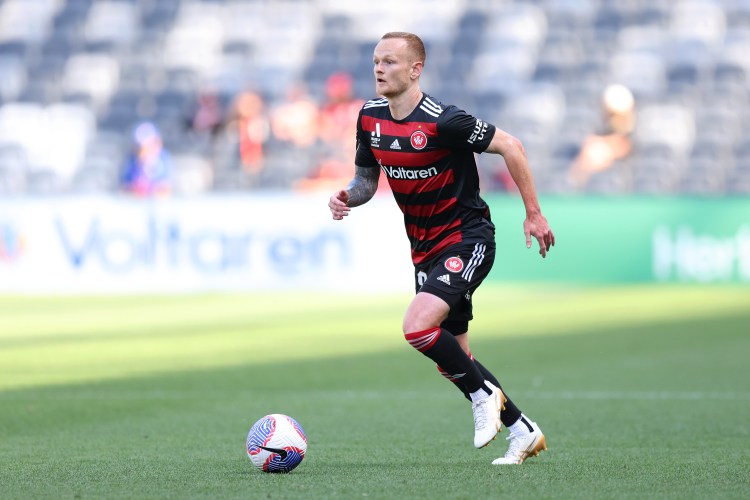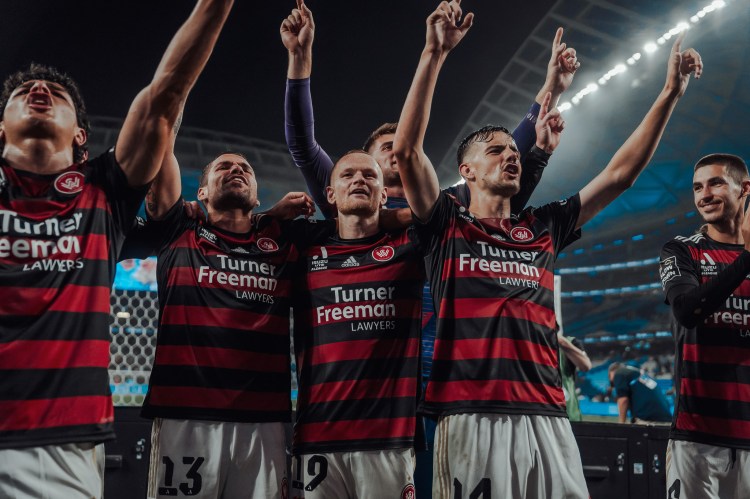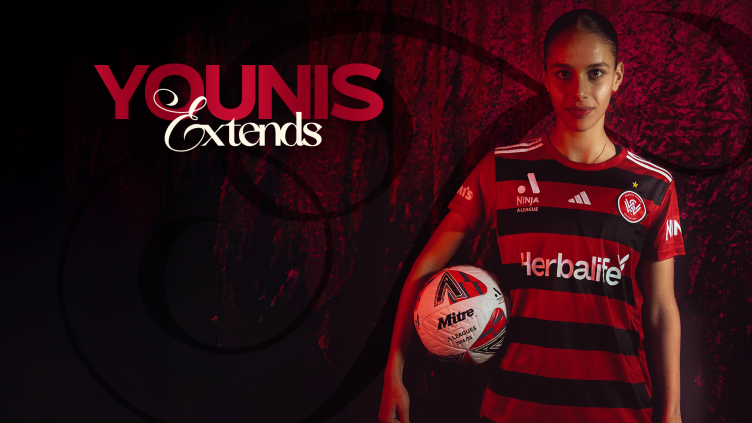Western Sydney Wanderers defender Jack Clisby almost gave football away – now at 31 he’s the happiest he’s ever been.
12 years on from the point he almost gave it all away, Jack Clisby can still recall the one conversation that prompted him to give his dream of playing professional football one more chance.
Keen to see the world and despondent at not having a professional contract in his pocket, a 19-year-old Clisby thought that dream had passed him by.
More than a decade later, in the form of his life for a team that’s second in the A-League, the “crazy” memory of how that life could have gone is still strong enough to make the Wanderers full-back shake his head.
It was his dad who helped the impatient teenager keep plugging away for another year, and get the break he needed.
But aleagues.com.au’s conversation with Western Sydney’s quietly spoken left-back this week is a reminder that getting into professional football is one thing; a different kind of hard work starts then, and mental resilience becomes as important a footballing tool as any other.

Clisby estimates that he and his wife have lived in 10 different houses over the years of his career, and it’s no coincidence that he feels settled in Sydney with two children and a sense of belonging in all parts of his life.
Not that he’s complaining for a second.
“You get to see a lot of a lot of the world and it’s something that maybe we do take for granted as hard as it can be, because not many people get to move around and live in different areas different states or different countries.
“All the experiences we get as footballers are quite phenomenal. What I’ve got to experience has been amazing.”
For Clisby that started when he won a youth contract at St Johnstone in Scotland, heading over from WA as a wide-eyed teenager.
“It was funny, my first day I just remember how physical it was, I got absolutely smashed because I was a winger back then, winger slash forward, believe it or not,” he laughs.
“My first training session, my first game, I couldn’t believe how different the style of play was. It was almost like the midfield didn’t exist because it was just centre-backs to forwards, the ball in behind and very transitional.
“I thoroughly enjoyed it! It was also a good time for me to sort of connect with my family because my mum and dad are originally from Scotland.”
But the innate uncertainty that football often entails was there from the start, at a club that went through three managers in a season. Eventually Clisby was told he would be released, without playing a first-team game, and It felt like the world had ended.
“When it didn’t quite work out (in Scotland), I came back and being a young player, you think it’s all doom and gloom, it feels like it’s over,” he says.
“To be honest, I wasn’t sure what path I was taking. I thought I was too old at 19, believe it or not. It was actually my old man that sat me down and said, ‘Look, it’s up to you, but you’ve worked your whole life to try and be a professional.
“You can either give it one more year in the WA NPL or you can just pack it in and just see what happens.
“It turned out I got a player of the whole season throughout the league and Perth Glory had a link to Inglewood United at the time.
“So I was on Glory’s radar and then they offered me a first team contract. It’s so crazy (how things change) from that one decision. Like, do I continue to just play for fun? I’m just thinking about maybe going traveling or whatever or do I give it another year?”
In the end the decision was to “give it all I’ve got and see what potentially could happen…. It meant I was playing with freedom in the NPL, enjoying it actually as a centre-back.
“So I got recognised from that one season with Inglewood and yeah… it took me on a journey throughout Australia.”
In truth it’s not a journey he anticipated would be so wide-ranging.
Tony Popovic signed him for Western Sydney in 2016 and believed in him, but left on the eve of the following season. Josip Gombau seemed less convinced but then he left too, and no one really knew where they stood.
“When I left Wanderers in the first place (in 2018), it was a tough time in my career because I was enjoying my time there but then the coach changes and you’re left not knowing who the manager is going to be the following season.

“I just didn’t know where I sat within the club and they couldn’t give me a definitive answer. It was a club that was hard to leave at the time but sometimes in football you have to make a decision to keep going rather than waiting and hoping.”
It says a lot about where the Wanderers were at that time that Clisby took the certainty of a contract offer from the team that had come last and become the league’s easybeats. By the time Clisby left the Mariners, three years later, they had climbed to third and played in the finals, but two more years of struggle would follow at Perth.
No wonder when Marko Rudan came calling and offered a return to Western Sydney – this time with a sense of direction – he felt like another move across the country was warranted.
“It’s interesting, I’ve been part of quite a few different squads, you know, I’ve been in teams where maybe I’ve been part of helping the rebuild phase of the team, as you mentioned with the Mariners.
“Yeah, there were some tough years there and I’ve moved around a bit. Moving back to Perth, that was a step in the right direction.

“But now I’m just enjoying my football, playing with confidence. I’m 31 now, I’ve been in the league for a while now and I’ve seen a lot of different systems, a lot of different coaches.
“This is the happiest and strongest I’ve felt in a team that’s doing really well.”
Clisby jokes about the pressures of family life, juggling training with the school run, his own studies and the demands of having two small children, but that’s also part of why he’s playing and feeling at his best.
At 31, he has resumed the personal training qualifications he began as part of his Plan B all those years ago when a football career hung in the balance.
“We’ve come a long way,” he grins. “From training without a GPS back when I first started, just rocking up and training in sunny Perth in just a singlet or a t-shirt.
“Now we’ve got the heart rates, the GPSs, the drones are out… the game’s evolved a lot and I feel like physically it has as well.
“The demand for output on players is high. Every game is hard, every team is fit, to be good in this league is challenging.
“But we’re footballers at the end of the day, we’re not working from eight ’til five like a lot of other people have to do.
“We come in here for hours but we’re working on the game, we’re out there playing football and learning tactically, technically, gym work, strength work.
“These are all things that it’s a privilege to do.”




